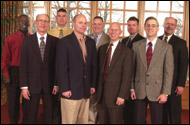
Front row:
David Kravitz, associate professor of managment; MBA graduate Russ Lloyd, Dean
Richard Klimoski, and MBA graduateRobert Waring.
Back row:
MBA grauduates Kenneth Green, Jeff Applegate, Ralph Standbrook,
Richard Lawson, and Phillip Buchanan, MBA director.
MBA-armed Officers Set Out to Change the Army
By Chuck Wagner
Anew breed of officer is walking Pentagon corridors. He understands financial markets, diminishing rates of return, and capital investment. His civilian counterpart might wear pinstripes; this officer wears service stripes.
Six Army majors—Jeffrey Applegate, Kenneth Green, Richard Lawson, Russell Lloyd, Ralph Standbrook, and Robert Waring—recently earned Master of Business Administration (MBA) degrees through an innovative program intended to put savvy private-sector principles at work for the military. These select few—part of a young Army career field named Functional Area 50—are the first batch of graduates to return to the Pentagon from George Mason University. A second class of five Functional Area 50 officers, commonly called FA50s, will graduate in December. More are on the way.
Army commanders are depending on them to enter planning rooms with the forward-thinking, critical mindset of a nickel-pinching entrepreneur.
“MBA students have the unique capability to not always accept the given answer,” says Lt. Col. Patrick Kirk, chief of FA50's proponency office. “They ask the 'what-ifs?' That is our job. We challenge everything.”
Most of all, FA50s are harbingers of organizational change in the Army. Kirk says FA50s are trained to look at alternatives and develop new ways of looking at problems, which “may not suit some as much as others.”
MBA-trained leaders bring a whole new arsenal of ideas to the table. “The business world educates themselves to look a lot harder at how they conduct change,” says Lawson. “We can look at how changes ultimately trickle down. It's not just guesswork.”
MBA students learn to structure an organization to drive efficiency and, therefore, productivity. How might that win wars? A future U.S. Army can beat even a much larger force, provided it operates more efficiently than the enemy.
FA50 is one of the Army's newest career fields. Words like “modular,” “integrate,” and “restructure” are peppered throughout descriptions of what FA50s do. The language is nothing less than a conceptualization of how the American military of the future will operate.
“We start with strategic plans and concepts. We help the Army look at itself 5, 10, 15 years out. We are constantly looking at force structure, today and tomorrow,” says Kirk.
This mission to get the most bang for the Army's buck, whether dealing with equipment, structure, or information flow, requires highly educated leaders, says Kirk.
FA50s accepted into the MBA program pass through a fine sieve. To enter, they must have a bachelor's degree with a competitive grade point average (3.50 out of 4.00 is the minimum). They must also have a score of 500 or higher on the Graduate Management Admission Test, a commander's letter of recommendation, an Army selection panel's approval, and ultimately, George Mason University's acceptance into the program.
About a dozen FA50 officers inquired about joining the program on each of the last two waves, and about half as many finished the acceptance process.
“The final product is phenomenal. The officer benefits, and the Army benefits from the knowledge,” says Kirk.
Army officials first looked into the possibility of allowing FA50s to attend an MBA program about three and half years ago. Bill Ryan, FA50 senior analyst, shopped around for a nearby graduate program willing to give the Army what it was looking for—George Mason fit the bill. Although the current crop of officers attended George Mason's standardized MBA program, Army officials are working with faculty to establish a force management concentration within the program, tailoring a program for the Army's focus.
This article first appeared in Pentagram. Reprinted with permission.
